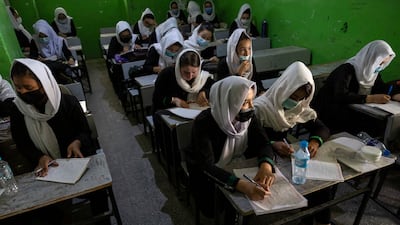The world’s richest countries should offer Afghanistan $8 billion in aid to help guarantee the education of girls in the country, former British prime minister Gordon Brown said.
Mr Brown, the UN’s special envoy for global education, said G7 nations must make the funds available for schooling as the Taliban takes over the country.
The last time the Taliban controlled Afghanistan, it banned girls from being educated. This time around, it has said they could attend school “within the framework of Islam”.
“G7 nations should make a bold offer of $8 billion of international aid for Afghan education over the next 20 years – the same as in the last 20 years – to be overseen by Unicef and the brave humanitarian agencies on the ground, including Education Cannot Wait, the refugee organisation that will be needed as the numbers of displaced children rise,” Mr Brown said.
“And the money should come on one condition – that the rights of girls to education are upheld.
“But we must be absolutely clear with the Taliban, nationally and locally, that aid will be withdrawn if girls’ rights are not upheld.”
The Taliban will be under the international spotlight after sweeping through Afghanistan and into power in Kabul.
It has indicated, without giving specifics, that it will be a softer version of the ideology removed from power after the 9/11 attacks on America.

But many of those persecuted previously fear history is about to be repeated.
“Taliban leaders ask us to believe they have changed from their days when they were guilty of persecuting women, and not only violating the basic rights of girls but denying them education,” Mr Brown said.
“And in an interview in June, the Taliban leadership did not reassure these girls about their schooling.
“They called for ‘separation between girls and boys, women and men, in universities, schools or madrasas’.
“For the future, they say their religious leaders ‘will decide whether girls are allowed to go to school or not’.”

Writing in The Mirror, he called the education of girls in Afghan classrooms one of the biggest success stories of the past 20 years.
He said the Taliban’s return to power “puts in jeopardy perhaps the biggest social achievement in Afghanistan in the last 20 years – the exponential rise in education from one million to 9.5 million pupils,” he said.
“At the peak, 65 per cent of young girls were attending first grade and 3.6 million girls were benefiting from primary or secondary education.
“Many who are among the 90,000 girls now in further education are training to be doctors, scientists and lawyers.”


